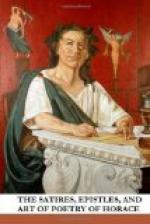Drawn to the house in glory’s car, the bard
Is made by interest, by indifference marred:
So slight the cause that prostrates or restores
A mind that lives for plaudits and encores.
Nay, I forswear the drama, if to win
Or lose the prize can make me plump or thin.
Then too it tries an author’s nerve, to find
The class in numbers strong, though weak in mind,
The brutal brainless mob, who, if a knight
Disputes their judgment, bluster and show fight,
Call in the middle of a play for bears
Or boxers;—’tis for such the rabble
cares.
But e’en the knights have changed, and now they
prize
Delighted ears far less than dazzled eyes.
The curtain is kept down four hours or more,
While horse and foot go hurrying o’er the floor,
While crownless majesty is dragged in chains,
Chariots succeed to chariots, wains to wains,
Whole fleets of ships in long procession pass,
And captive ivory follows captive brass.
O, could Democritus return to earth,
In truth ’twould wake his wildest peals of mirth,
To see a milkwhite elephant, or shape
Half pard, half camel, set the crowd agape!
He’d eye the mob more keenly than the shows,
And find less food for sport in these than those;
While the poor authors—he’d suppose
their play
Addressed to a deaf ass that can but bray.
For where’s the voice so strong as to o’ercome
A Roman theatre’s discordant hum?
You’d think you heard the Gargan forest roar
Or Tuscan billows break upon the shore,
So loud the tumult waxes, when they see
The show, the pomp, the foreign finery.
Soon as the actor, thus bedizened, stands
In public view, clap go ten thousand hands.
“What said he?” Nought. “Then
what’s the attraction? “Why,
That woollen mantle with the violet dye.
But lest you think ’tis niggard praise I fling
To bards who soar where I ne’er stretched a
wing,
That man I hold true master of his art
Who with fictitious woes can wring my heart,
Can rouse me, soothe me, pierce me with the thrill
Of vain alarm, and, as by magic skill,
Bear me to Thebes, to Athens, where he will.
Now turn to us shy mortals, who, instead
Of being hissed and acted, would be read:
We claim your favour, if with worthy gear
You’d fill the temple Phoebus holds so dear,
And give poor bards the stimulus of hope
To aid their progress up Parnassus’ slope.
Poor bards! much harm to our own cause we do
(It tells against myself, but yet ’tis true),
When, wanting you to read us, we intrude
On times of business or of lassitude,
When we lose temper if a friend thinks fit
To find a fault or two with what we’ve writ,
When, unrequested, we again go o’er
A passage we recited once, before,
When we complain, forsooth, our laboured strokes,
Our dexterous turns, are lost on careless folks,
When we expect, so soon as you’re informed
That ours are hearts by would-be genius warmed,
You’ll send for us instanter, end our woes
With a high hand, and make us all compose.




